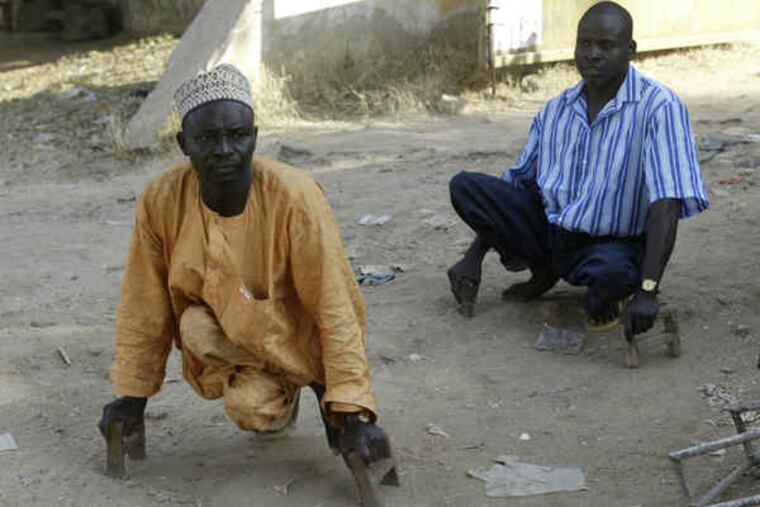Imams switch sides in Nigeria's polio war
KANO, Nigeria - In 2003, imams in northern Nigeria fomented a boycott of polio vaccinations, claiming they were a Western plot to make Muslims infertile or infect them with AIDS. The result: The number of newly crippled children more than doubled the following year, and there were fears that the disease would spread into a dozen neighboring countries.

KANO, Nigeria - In 2003, imams in northern Nigeria fomented a boycott of polio vaccinations, claiming they were a Western plot to make Muslims infertile or infect them with AIDS. The result: The number of newly crippled children more than doubled the following year, and there were fears that the disease would spread into a dozen neighboring countries.
Now, after another tripling of cases in 2008, a new anti-polio push is under way in Africa's most populous country. This time, some Muslim clerics have made themselves part of the solution, joining community leaders, health workers, and the victims themselves in waging the war.
In the dusty streets of Kano, northern Nigeria's main city, town criers with bullhorns cut through the traffic and crowds, urging parents to take their children to one of hundreds of vaccination centers. Radio and newspapers are full of get-vaccinated ads.
One victim-turned-campaigner is Yusuf Umar, 43. With his legs withered by polio, he propels himself on handheld blocks of wood.
"Look at me," he tells parents of young children waiting to be immunized, just in case any are having second thoughts. "Do you want your child to look like me?"
Umar belongs to the Kano Polio Victims Trust Association, which began with just eight members and eight years later has 2,350. In the yard outside the trust's headquarters, sparks fly as welders fashion contraptions to keep victims mobile - plastic garden chairs on bike wheels that become wheelchairs, flat-ended metal pipes that control car pedals by hand.
Once in receipt of their customized vehicles, association members scoot, pedal, and drive around with vaccination teams to field clinics and schools, preaching war on polio.
Their outreach campaign seems to be bearing fruit. While new infections of children hit 788 last year, the World Health Organization reports that the number vaccinated in Kano State during the first half of 2008 rose 26 percent, compared with the same period of 2007.
Still, last year's spike has raised fears that the disease could be exported again to surrounding polio-free countries and threaten a multibillion-dollar effort to wipe the disease from the globe.
"We thought we were winning," said Dr. Hamisu Walla, national surveillance officer with the WHO. "We were shocked and depressed at the same time to have done so much and then to have this upsurge."
The 2003 boycott lasted a year, until its hard-line Muslim supporters were persuaded to drop it, and 2004 saw the number of newly crippled children rise from 355 to 792. Even so, doubts about the vaccine have lingered, and some religious leaders continue to say Islam forbids it.
At least one Muslim leader took unprecedented action against the boycott supporters. The Shehu of Borno, the top Islamic authority in his state until his death in February, stripped a chief of his traditional title in September for divorcing his wife after she had their children immunized.
Muhammad Ali Pate, a senior Health Ministry doctor, said increased state funding and greater community engagement were responsible for last year's increase in vaccinations. He said imams at Friday prayers now urge worshipers to have their children immunized, and traditional leaders track children who have not received the vaccination.
"Vaccination can't just be something we do to them, because it arouses their suspicion. We are trying to generate a demand for the vaccine," Pate said. "We want the community to understand polio, to make the link between paralysis and the disease."
That is evident in Kano as Monday Tijani carries his 10-month-old daughter, Gift, to a mobile clinic.
"There was a time when we feared the polio vaccine," said Tijani, 28. "But now we have seen what this disease can really do. I have seen the polio victims all around, and I know it's better for Gift to get the vaccine."